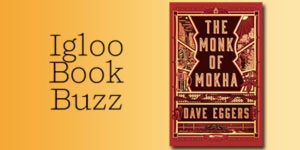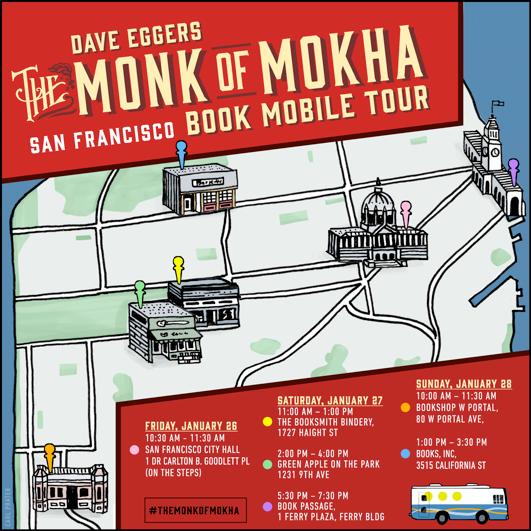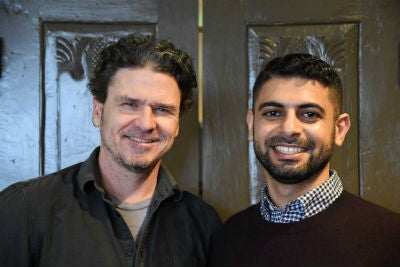A Book about Coffee? Dave Eggers and Mokhtar Alkhanshali Spill the Beans
 Our latest Igloo Book Buzz selection is THE MONK OF MOKHA by bestselling author Dave Eggers. Published by Knopf, this book tells the remarkable true story of Mokhtar Alkhanshali, a young Yemeni American man, raised in San Francisco, who dreams of resurrecting the ancient art of Yemeni coffee but finds himself trapped in Sana’a by civil war. Mokhtar is 24 years old and working as a doorman when he discovers the astonishing history of coffee and Yemen’s central place in it. He leaves the Bay Area and travels deep into his ancestral homeland to tour terraced farms high in the country’s rugged mountains and meet beleaguered but determined farmers. But when war engulfs the country and Saudi bombs rain down, Mokhtar has to find a way out of Yemen without sacrificing his dreams or abandoning his people.
Our latest Igloo Book Buzz selection is THE MONK OF MOKHA by bestselling author Dave Eggers. Published by Knopf, this book tells the remarkable true story of Mokhtar Alkhanshali, a young Yemeni American man, raised in San Francisco, who dreams of resurrecting the ancient art of Yemeni coffee but finds himself trapped in Sana’a by civil war. Mokhtar is 24 years old and working as a doorman when he discovers the astonishing history of coffee and Yemen’s central place in it. He leaves the Bay Area and travels deep into his ancestral homeland to tour terraced farms high in the country’s rugged mountains and meet beleaguered but determined farmers. But when war engulfs the country and Saudi bombs rain down, Mokhtar has to find a way out of Yemen without sacrificing his dreams or abandoning his people.
Here is a conversation with Dave Eggers and Mokhtar Alkhanshali revolving around coffee, research for THE MONK OF MOKHA, and the road trip of a lifetime.
This book is about coffee, but I understand that neither of you were longtime coffee drinkers?
DE: I had my first cup of coffee when I was 35. My wife and I were new parents and sleep was elusive, so to stay awake and have even a little acuity, I needed a new source of caffeine—Diet Mountain Dew wasn’t working anymore. I will say that when you come to coffee relatively late in life, it has an otherworldly kick. But Mokhtar taught me how to appreciate coffee as more than a caffeine-delivery tool.
MA: I didn’t drink coffee much, mainly because the only coffee I was exposed to was cheap diner coffee that tasted like burnt popcorn. I thought coffee was too dark and bitter. One day I walked into a specialty coffee shop and had a cup of naturally processed coffee from Ethiopia’s Yirgacheffe region. I tasted blueberries, honeysuckle and it had a sweet lingering after taste. The barista spoke to me about where it was grown, the elevation, varietal, how it was processed— but most of all, how their direct relationship to these growers make it possible for the farmers to make more money and live a better life. That part of it really became my entry point to the world of coffee.
Mokhtar, you discovered your family’s connection to coffee, and the Yemeni connection to coffee, when you were in your early twenties. What possessed you to actually go to Yemen and re-invent yourself as a coffee importer?
MA: That’s a question that a lot of people ask me. In many ways, I’m still trying to figure it out myself. To be honest, I didn’t have a master plan, I just felt there was a disconnect between Yemen and the world of coffee and I believed I could be that bridge. Looking back, I don’t know if I would have gone on this journey knowing all of the things I’d have to learn and go through. I was naïvely arrogant.
Dave, as a relative newcomer to the coffee world, what was the research like for THE MONK OF MOKHA?
 DE: Mokhtar and I had met before, but the first time we saw each other after he returned from Yemen was at the Blue Bottle headquarters in Oakland. James Freeman, the founder, happened to be there that day, so between Mokhtar telling me much of his story, and the setting, it was a really immersive first step. But I was still skeptical. My impression was that there was a lot of pretension in the specialty coffee world. But I learned that the obsessive care that goes into one cup of coffee is coming from the same place much of the slow-food movement is coming from. It’s a reversal of the dehumanizing effects of industrial food consumption. When it comes to coffee, listening to Mokhtar’s enthusiasm—and utter lack of pretension—really made me a convert. With any comestible, if you care about its quality, and if the people making it care, too, it will take longer and cost more.
DE: Mokhtar and I had met before, but the first time we saw each other after he returned from Yemen was at the Blue Bottle headquarters in Oakland. James Freeman, the founder, happened to be there that day, so between Mokhtar telling me much of his story, and the setting, it was a really immersive first step. But I was still skeptical. My impression was that there was a lot of pretension in the specialty coffee world. But I learned that the obsessive care that goes into one cup of coffee is coming from the same place much of the slow-food movement is coming from. It’s a reversal of the dehumanizing effects of industrial food consumption. When it comes to coffee, listening to Mokhtar’s enthusiasm—and utter lack of pretension—really made me a convert. With any comestible, if you care about its quality, and if the people making it care, too, it will take longer and cost more.
Otherwise, the research took place on many levels, because the story has so many facets. There’s Mokhtar’s personal story—his upbringing and ambitions as a young man in San Francisco. There’s the Tenderloin neighborhood and, in contrast, the high-rise world of the Infinity, where Mokhtar worked as a doorman. There’s his extended family in the Central Valley, where we went early in the research process. Then there’s the world of coffee, from plant to cup. There’s Boot Coffee in Mill Valley, where Mokhtar learned about roasting and grading. I had to get familiar with all these worlds before we even went to Ethiopia, Djibouti and Yemen.
Mokhtar, you’ve done a fair amount of public speaking, and you’d given presentations many times to various audience before meeting Dave. How was that kind of storytelling different than what you did with Dave for the book?
MA: What I went through with Dave was a very intimate road trip. Dave was incredibly warm and someone I felt comfortable being vulnerable with. Some of those memories were hilarious and others required lots of tissues. Dave’s caring and loving personality were what made this book possible because I know I wouldn’t have been able to do this with anyone else.
Dave, what drew you most to Mokhtar’s story?
DE: For me it was first of all a story of towering will and imagination. For a guy as young as Mokhtar to simply reinvent himself, to risk so much to re-create his life, it’s astonishing. The more I learned, the more remarkable his story became. I think it was about 18 months into our interviews when he told me that he sometimes had to carry a grenade on his jacket in Yemen, just to imply he was not to be trifled with—in the pursuit of coffee beans. When I met Mokhtar, he was a doorman, so to see what he’s built in these last five years, is just awe-inspiring.
Mokhtar and Dave, you two traveled to Ethiopia, Abu Dhabi, Djibouti and Yemen together. Do you have favorite stories from your travels?
MA: Hmm that’s a hard one. Besides those international trips, the local ones here were a lot of fun. Going down to visit my grandmother in southern California and hearing her tell her story, visiting my friend Jay Ruskey’s farm in Santa Barbara, probably the most impactful trip for me was Djibouti. I didn’t tell Dave this but at the time I was terrified about going. Part of my therapy was to go into these places where I had a negative association because of past trauma. I wanted to go to Djibouti and face my fears. Experiencing 130-degree weather and getting stuck in a sandstorm didn’t help, but when I left I felt a huge weight lift off of my shoulders and I’m always going to thank Dave for being there with me.
DE: I have a story. We spent a few years trying to get into Sana’a together, but when the war broke out, it was impossible for me to safely get into the capital. So we went to a more remote part of Yemen, and there we encountered an Italian man who was on a quest to visit every country on earth. He was very cynical, with a mordant humor that seemed at odds with a man so curious about the world. When he heard that Mokhtar imported high-end coffee from Yemen, and that Mokhtar was a Q grader—the equivalent of a sommelier in the wine world—he scoffed. He thought this was a pretentious affectation, a sign of the world’s decadence. “A coffee sommelier? What’s next?” he asked. But then, Mokhtar told his story, and explained the world of coffee to this man—how Q graders can improve the lives of farmers, and how caring about where coffee, or any crop, comes from is actually a deeply humanistic thing. Mokhtar did all this while grinding and brewing fresh Yemeni coffee. By the time Mokhtar was pouring him a cup, the Italian wanted to know how he could invest in Mokhtar’s company. No joke, that all happened in about 15 minutes—this guy went from cynic to believer. The same thing happened to me, I guess.

